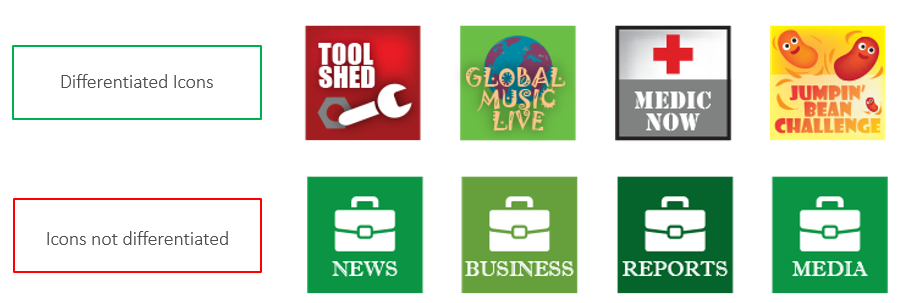How we are improving Windows Store app catalog
As of today, we are enforcing a more robust approach to 10.1 app certification policy (“Distinct Function & Value; Accurate Representation”) for both new and existing apps to ensure customers can easily find high-value, high-quality apps when shopping in Windows Store. These changes will help customers more rapidly find the apps they are specifically seeking.
We will identify apps that are not following the policies, informing developers of issues we locate, and removing apps that don’t comply. This effort will be focused in four areas that I will describe in more detail in this post:
- Eliminating app clutter
- Ensuring apps are appropriately priced
- Distinguishing informational apps
- Ensuring relevant app titles and keywords
Eliminating app clutter
Visual and category clutter negatively impact customer experience with Windows Store.
This includes apps with similar icons and titles that can be confusing to customers, in addition to app icons and titles when they don’t match the app content.
Apps that can’t be distinguished from other apps in the Store, have icons or titles that are too similar to other apps already in the Store, or don’t properly represent the functionality of the app may be removed.
We may also remove apps that do not offer unique content, creative value or utility. For example when there are many apps that do not provide differentiated value (e.g. many flashlight apps with the same look and feel and functionality), some may be removed from the Store. This will help customers access high value content in each of the Store categories.
Ensuring appropriate app pricing
The price of an app must reflect its value. Customers need to know that when they purchase apps from Windows Store, they are paying a fair price. While developers retain sole pricing discretion, they should price apps based on their app’s value and functionality. This means that similar apps should generally be comparable in price. This also means that while developers may use pricing to promote their apps, they must not utilize irregular or unfair practices that violate Windows Store Code of Conduct.
If an app is priced significantly higher than other apps in its category and it is determined that users might be confused and believe (incorrectly) that the higher price is warranted based on superior functionality or value, it may be removed from the Store.
Distinguishing informational apps
It is important that when a customer purchases an app, she or he knows what they are buying. Informational apps, like guides, tutorials, instructional content, reference materials, and other similar types of apps must be easily identified, so customers don’t accidentally purchase an informational app when they intended to purchase a functional app (e.g. a game guide vs. an actual game).
In order to make it clear to users what they are buying, informational apps that are not easily identifiable as reference apps, must distinguish themselves by prominently displaying a text or banner labeling it as such. If an informational app violates this policy, it may be removed from the Store.
Ensuring relevant app titles and keywords
Customers can more easily identify what they are buying when an app’s title, description, tags, and keywords are accurate and relevant to the app’s function. For these reasons, Windows Store requires that an app’s description or title does not state that the app is similar to, or better than other apps, unless the apps are comparable.
In addition, developers may not use popular and irrelevant keywords to manipulate an app’s placement in search results or overall ranking. Apps should only have a maximum of eight keywords, and those keywords must be relevant to the function of the app.
If your app has a title, description or keywords that are not relevant to the app purpose, or include keywords that are not related to the app, it may be removed from the Store.
More information on keywords is available here.
Policy 10.1 has been designed to improve Windows Store experience for both developers and customers. As developers, you increase the possibility of success if you follow these practices when developing and publishing apps that are unique, and that add value.
While these guidelines will be implemented to ensure compliance with Policy 10.1, they are not related to intellectual property compliance (more information on intellectual property protection is available here). As always, we invite anyone that is concerned about misuse of their intellectual property to submit notices of infringement to our reporting tool here.
I’d like to suggest that you take a moment to review these guidelines as well as Windows Store app certification policies to avoid any issues. Finally, you’ll want to make sure your account contact email is accurate in Dev Center, as this is the email the Store uses to begin a dialog with you if we locate any problems with your apps.


